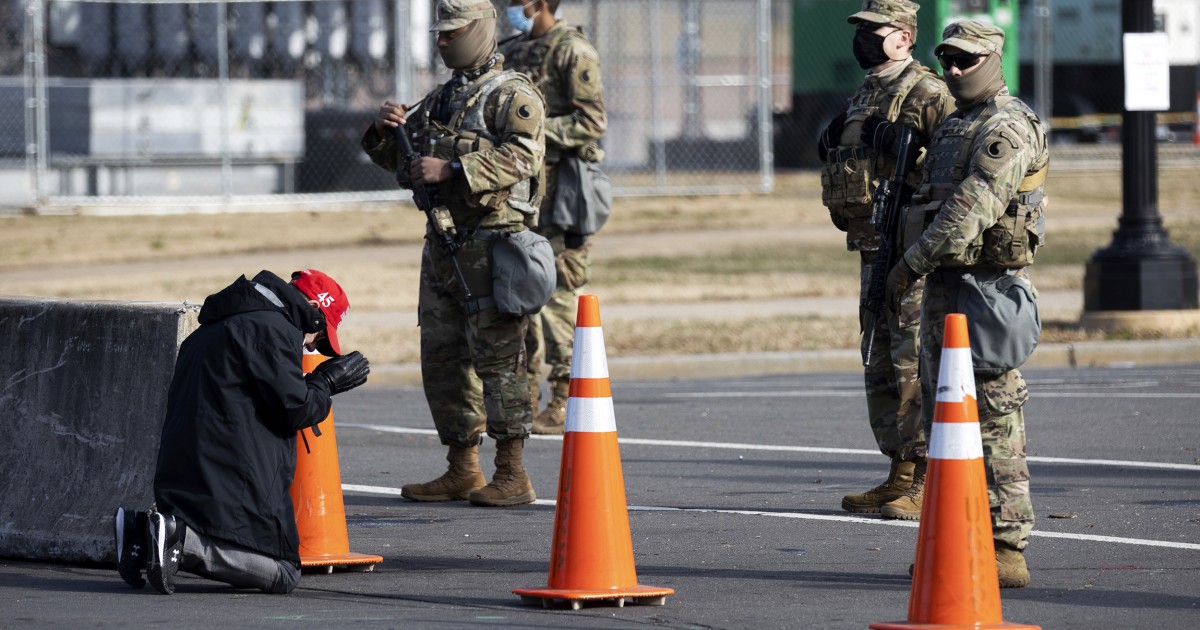
For some Republicans, Inauguration Day did not bring the joyful deliverance experienced by Democrats or even simple disappointment. Rather, it opened a new chapter in the long history of white Christian nationalism and perhaps the beginning of a new Lost Cause myth — a very worrisome development for the future of American democracy.
The basic storyline of white Christian nationalism is simple, and you’ve assuredly heard it before: America was founded as a Christian nation by (white) Christians based on “biblical” (meaning “Protestant”) principles. America’s white, Christian heritage is, adherents claim, the source of America’s power and prosperity — both of which they believe are threatened by the increasing number of nonwhites, non-Christians and noncitizens on American soil.
The theological ideas behind white Christian nationalism are derived from two questionable interpretations of Scripture. In the first, America is the new Promised Land, and Americans are God’s new Chosen People. It was, in this interpretation, God’s design that the colonists take the land — by force if necessary.
In Christian nationalism, this Promised Land story is then combined with another questionable interpretation of Scripture: an End Times story. They believe that the Second Coming is imminent and that the battle between Good and Evil is already underway. And, of course, (conservative, white) Christians are inherently on the side of the Good, and their political enemies are on the side of Evil.
While some contemporary observers seem to think that white Christian nationalism is something new, the philosophy itself first took shape in the 1690s.
What binds these stories together is the blood spilled on America’s frontier and its battlefields — blood they believe was sacrificed on the altar of the nation to appease an angry God and to secure American power. Service to God and service to nation, then, are mixed together with blood.
While some contemporary observers seem to think white Christian nationalism is something new — and, certainly, Republican Jesus memes themselves are a new spin on the genre — the philosophy itself first took shape in the 1690s.
Two things happened: First, Puritan theologians began to see their wars in the northeast colonies against the Catholic French and their Indian allies through an apocalyptic lens, and the ideas of religion and nation, as well as Protestantism and Englishness, started to merge.
Meanwhile, in the colony of Virginia, the enslavement of Black people was becoming racial, whereas, before, its justification had been religious: Black and Native peoples could be enslaved, it was believed, because they were “heathens.” But as more enslaved Black people converted (or were forced to convert) to Christianity, a new justification for their continued enslavement was found: the emerging concept of race, which was still understood in theological terms as a “divine curse” on the “black race.”
In the wake of Trump’s presidency, the two philosophies — Christian nationalism and the Lost Cause — once rivals, are now becoming allies.
Thus, religion and nation became entangled with color. Later, they would be bound even more tightly together with the pseudoscientific theories of race. White Christian nationalism was born.
The “Lost Cause” myth emerged later, after the Civil War, as a rival to the white Christian nationalism espoused by a triumphant Union. It was the mythology that the white Southerners propagated to explain Confederate defeat, equating the Confederacy and its leaders with no less than a crucified Christ. The implication, of course, is that they will all rise again.
In the wake of Trump’s presidency, the two philosophies, once rivals, are becoming allies.
The merging white Christian nationalism — which requires a triumphant and ongoing American state — and the Lost Cause philosophy — which essentially argues for its destruction so the racist Confederacy can rise — may not have begun with Trump, but his campaign and then his presidency crystallized it. One reason is that the “Make America Great Again” narrative echoes the white Christian nationalist philosophy: When Trump said, “Make America Great Again,” many conservative white evangelicals heard “Make America Christian Again.”
And they — and those more interested in the Lost Cause — heard its unmistakable subtext: “Make It White Again, Too.”
White Christian nationalists had long worshipped a Golden Calf in the shape of the United States; after 2016, they bowed down before an Orange Monarch.
Trumpism added something new, as well: political messianism. The American revolutionaries had proclaimed “No King but King Jesus!” but their would-be modern-day heirs seem to see Trump as, if not Jesus, at least a king sent by God to deliver us from the hands of our enemies. White Christian nationalists had long worshipped a Golden Calf in the shape of the United States; after 2016, they bowed down before an Orange Monarch.
After Trump lost the election in November, the two philosophies drew even closer. Increasingly, white Christian nationalists and Lost Causers bought into the conspiracy theory that the election had been stolen, and they fixated on the syllogism that the (fake) stolen election was effectively the death of America — and tantamount to the crucifixion of Christ. Then, after the second impeachment vote on Jan. 13, Franklin Graham compared House Speaker Nancy Pelosi, D-Calif., to Judas Iscariot, implying that Trump was a betrayed Christ. (Some on the Trump sub-Reddit went even further, posting depictions of Trump as a crucified Christ.) The clear implication, of course, was that they would all rise again together.
But they did not. Not on Jan. 6. And not on Jan. 20 — President Joe Biden was inaugurated.
So why does this still matter? After all, the man who would be king has been banished to his Epcot Versailles in Palm Beach. The most immediate danger is that he will seek and perhaps even achieve a royal Restoration that is also a divine Resurrection. Certainly, Trump’s disciples have not given up hope.
What will be required in the coming years to combat the dangerous threat of white Christian nationalism Lost Causery is a popular front in defense of liberal democracy.
More worrisome is that a significant segment of white Christian America took and does not seem keen to retreat from yet another turn toward political authoritarianism — and that some were and remain ready to engage in political violence. How large a segment of the population they are and how sharp the turn toward authoritarianism remains to be seen.
So what can be done?
It is important to recognize that not all conservative white evangelicals are white Christian nationalists. Some, such as Peter Wehner and Russell Moore, rejected Trumpism and white Christian nationalism from the very beginning. What’s more, a serious and self-critical discussion of white Christian nationalism is taking place among some conservative white Christians — prompted in no small part by the work of Black theologians such as Jemar Tisby and Esau McCaulley.
Recently, the faculty of Wheaton College — the “evangelical Harvard” —released a statement denouncing Christian nationalism and white supremacism as heresies. While conservative evangelicals will often disagree with secular progressives on matters of policy, a good many still strongly agree with them on the question of polity: democratic or not.
And we can begin by more openly acknowledging that America was not and is not a Christian nation, even if there is no doubt that its founding values — freedom, equality, justice and inclusion — were partly inspired by Christian teachings, teachings that need not be rejected by non-Christians simply because they are Christian in origin.
What will be required in the coming years to combat the dangerous threat of white Christian nationalism Lost Causery is a popular front in defense of liberal democracy — a coalition that stretches from Rep. Alexandria Ocasio-Cortez, D-N.Y., and Sen. Bernie Sanders, I-Vt., to Sen. Mitt Romney, R-Utah, and the former and current Republicans of the anti-Trump Lincoln Project. They may all have deep disagreements with one another, but at least they are in agreement that the right way to hash them out is by democratic means.
Source: | This article originally belongs to Nbcnews.com










